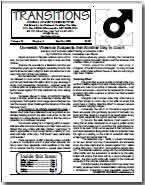I am a feminist. I have marched at the barricades, subscribed to Ms. magazine, and knocked on many a door in support of progressive candidates committed to women’s rights. Until a month ago, I would have expressed unqualified support for Title IX and for the Violence Against Women Act.
But that was before my son, a senior at a small liberal-arts college in New England, was charged—by an ex-girlfriend—with alleged acts of “nonconsensual sex” that supposedly occurred during the course of their relationship a few years earlier.
What followed was a nightmare—a fall through Alice’s looking-glass into a world that I could not possibly have believed existed, least of all behind the ivy-covered walls thought to protect an ostensible dedication to enlightenment and intellectual betterment.
It began with a text of desperation. “CALL ME. URGENT. NOW.”
That was how my son informed me that not only had charges been brought against him but that he was ordered to appear to answer these allegations in a matter of days. There was no preliminary inquiry on the part of anyone at the school into these accusations about behavior alleged to have taken place a few years earlier, no consideration of the possibility that jealousy or revenge might be motivating a spurned young ex-lover to lash out. Worst of all, my son would not be afforded a presumption of innocence.

Getty Images
In fact, Title IX, that so-called guarantor of equality between the sexes on college campuses, and as applied by a recent directive from the Department of Education’s Office for Civil Rights, has obliterated the presumption of innocence that is so foundational to our traditions of justice. On today’s college campuses, neither “beyond a reasonable doubt,” nor even the lesser “by clear and convincing evidence” standard of proof is required to establish guilt of sexual misconduct.
These safeguards of due process have, by order of the federal government, been replaced by what is known as “a preponderance of the evidence.” What this means, in plain English, is that all my son’s accuser needed to establish before a campus tribunal is that the allegations were “more likely than not” to have occurred by a margin of proof that can be as slim as 50.1% to 49.9%.
How does this campus tribunal proceed to evaluate the accusations? Upon what evidence is it able to make a judgment?
The frightening answer is that like the proverbial 800-pound gorilla, the tribunal does pretty much whatever it wants, showing scant regard for fundamental fairness, due process of law, and the well-established rules and procedures that have evolved under the Constitution for citizens’ protection. Who knew that American college students are required to surrender the Bill of Rights at the campus gates?
My son was given written notice of the charges against him, in the form of a letter from the campus Title IX officer. But instead of affording him the right to be fully informed, the separately listed allegations were a barrage of vague statements, rendering any defense virtually impossible. The letter lacked even the most basic information about the acts alleged to have happened years before. Nor were the allegations supported by any evidence other than the word of the ex-girlfriend.
The hearing itself was a two-hour ordeal of unabated grilling by the school’s committee, during which, my son later reported, he was expressly denied his request to be represented by counsel or even to have an attorney outside the door of the room. The questioning, he said, ran far afield even from the vaguely stated allegations contained in the so-called notice. Questions from the distant past, even about unrelated matters, were flung at him with no opportunity for him to give thoughtful answers.
The many pages of written documentation that my son had put together—which were directly on point about his relationship with his accuser during the time period of his alleged wrongful conduct—were dismissed as somehow not relevant. What was relevant, however, according to the committee, was the unsworn testimony of “witnesses” deemed to have observable knowledge about the long-ago relationship between my son and his accuser.
That the recollections of these young people (made under intense peer pressure and with none of the safeguards consistent with fundamental fairness) were relevant—while records of the accuser’s email and social media postings were not—made a mockery of the very term. While my son was instructed by the committee not to “discuss this matter” with any potential witnesses, these witnesses against him were not identified to him, nor was he allowed to confront or question either them or his accuser.
Thankfully, I happen to be an attorney and had the resources to provide the necessary professional assistance to my son. The charges against him were ultimately dismissed but not before he and our family had to suffer through this ordeal. I am of course relieved and most grateful for this outcome. Yet I am also keenly aware not only of how easily this all could have gone the other way—with life-altering consequences—but how all too often it does.
Across the country and with increasing frequency, innocent victims of impossible-to-substantiate charges are afforded scant rights to fundamental fairness and find themselves entrapped in a widening web of this latest surge in political correctness. Few have a lawyer for a mother, and many may not know about the Foundation for Individual Rights in Education, which assisted me in my research.
There are very real and horrifying instances of sexual misconduct and abuse on college campuses and elsewhere. That these offenses should be investigated and prosecuted where appropriate is not open to question. What does remain a question is how we can make the process fair for everyone.
I fear that in the current climate the goal of “women’s rights,” with the compliance of politically motivated government policy and the tacit complicity of college administrators, runs the risk of grounding our most cherished institutions in a veritable snake pit of injustice—not unlike the very injustices the movement itself has for so long sought to correct. Unbridled feminist orthodoxy is no more the answer than are attitudes and policies that victimize the victim.
Ms. Grossman, an attorney and mother, lives in New York City.
A version of this article appeared April 17, 2013, on page A15 in the U.S. edition of The Wall Street Journal, with the headline: A Mother, a Feminist, Aghast.
Source: Judith Grossman: A Mother, a Feminist, Aghast (http://online.wsj.com/article/SB10001424127887324600704578405280211043510.html)


